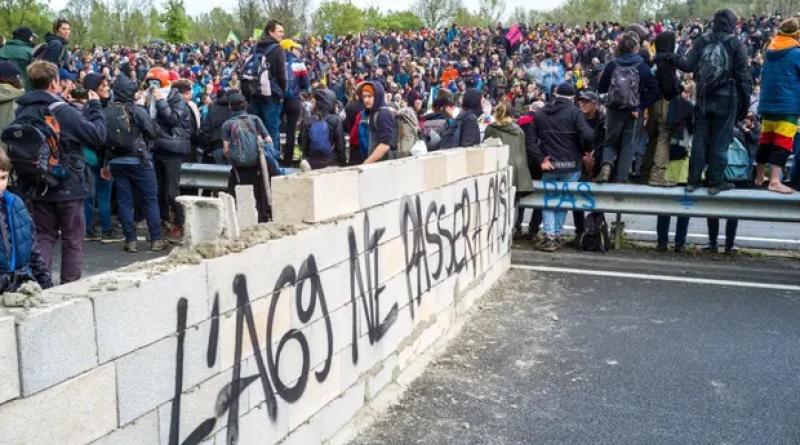Fire and concrete: will France’s model of radical climate protest catch on?

In the UK, when climate activists want to block a road, they sit down on it. When their fellow activists in France want to do the same, they build a wall across one side, and set the other side on fire.
As Extinction Rebellion drew tens of thousands to their peaceful “Big One” protests in London last month, in the south of France 8,500 environmental protesters occupied the road from Toulouse to the town of Castres.
In protest at plans for a new motorway, which critics say will devastate agricultural land and accelerate climate breakdown, the coalition of organic farmers, environmentalists, communists and anarchists danced to techno and raced soapboxes along the carriageway. Then they used breeze blocks and concrete to block one side of the carriageway, while on the other they piled haystacks and tyres and set them ablaze.
Remarkably, they did so without any interruption from police, despite perpetrating a level of illegal disruption unheard of across the Channel.
As climate protests hot up around the world once again, eyes have been turning to France as the country taking it to its most radical extent. This month, Andreas Malm, the human ecologist and author of the climate activist bible How to Blow Up a Pipeline, said in an interview it was France that was seeing the most exciting developments in environmental protest.But why is it in France that environmental activists are taking the most radical action?
The battle of Sainte-Soline
Before last month’s march, the French protesters gathered at a camp on land provided by a local dairy farmer whose farm, just outside Castres, would be sliced in two by the new A69 motorway. Police had warned them that they could block access to the site at any moment.
Three young activists with France’s organic farmers’ union the Confédération Paysanne, Mathieu, Victor and Valentin, said there were fears about how the police would respond to the protest. It was to be the first major environmental protest since a fierce battle between activists and police in March at a controversial reservoir project in Sainte-Soline.
On 25 March, thousands of environmental protesters had defied an official ban on protests to gather at a camp near the small town, south-west of Poitiers, near France’s west coast, with many intent on sabotaging the 628,000 sq metre reservoir. They were met by a huge police response: 20 squadrons of mobile gendarmes, nine helicopters, four armoured vehicles, and four water cannon, with officers arranging themselves in defensive formations around the construction site.Subsequent scenes, filmed by journalists and activists, were shared widely. Protesters were seen running towards the police lines through volleys of teargas grenades, while gendarmes flanked them on quad bikes. Activists fired improvised firework mortars at officers, who responded with baton rounds.
The battle lasted roughly an hour. Mathieu, Victor and Valentin told how, after activists had started covering teargas canisters with earth to stop their fumes dispersing, police switched to using flash bang grenades. Several protesters lost fingers as a result, the three activists said, while others were injured after standing on dormant grenades.
By the time it was over, police had, by their own account, fired more than 5,000 teargas grenades, more than 100 stun grenades, and 81 baton rounds. The French interior ministry said 28 gendarmes were hurt, two of them seriously. Organisers counted 200 protesters injured in the fighting, with one still in a coma more than a month later.
In the following days, there were dozens of rallies denouncing the police violence at government buildings around France. The minister of the interior, Gérald Darmanin, announced he intended to ban Les Soulèvements de la Terre (Earth Uprisings), a group that had played a key role in organising the protest.
‘There is no question of working with the police’
Les Soulèvements de la Terre was among a number of organisations that had called the Castres protest last month. Darmanin had backed down from his threat to ban the group, but the motorway project was one of 42 which he had claimed in parliament were “likely to give rise to extremely violent protests”, including “against republican institutions”. According to reports, a contingent of nearly 800 gendarmes and CRS riot police was deployed, including eight mobile units.As the sun rose over the camp on Saturday morning, the scale of the protest could be seen. Hundreds of campers had spent the night in tents next to two big tops decked out with sound systems and furniture. Marquees housed a kitchen handing out banana porridge and coffee. Compost toilets were provided for protesters’ convenience
A young activist called Birdie explained that even though they intended the day’s protest to be peaceful, activists in France were extremely wary of police – and therefore of the media. “The French government has this doctrine of how they want to deal with protesters, which is violence and weapons and surveillance,” Birdie said.
“And so it means that as protesters … we have to protect ourselves from the government. I know that the police know who I am. I know they know who my friends are, who my family is, and they will just grab anything to repress me, to put me in prison.”
Birdie said Darmanin called them “terrorists”. “You can see this camp: we’re not terrorists. We are just people who cook, who clean, who put up toilets, who play music, who protest. This is something that we do. We are not violent people. But they try to make us pass as violent people and as terrorists. And as such, we have to be careful what we show and who we show we are.”
Jean-Luc Herve, an organic farmer and member of Confédération Paysanne, was one of a few taking part in the Castres protests who would speak on the record. He explained that the new road would devastate agriculture in the area.“The demonstration, it’s a protest against the A69 motorway project,” Herve said. “We [already] have a national road between Toulouse and Castres. At rush hour, it currently operates at 30% capacity so we absolutely don’t need to build a motorway next to this national road because there are not enough vehicles to use it.
“There are a lot of negative impacts. The first impact for us, as farmers of the Confédération Paysanne union, is the artificialisation of the land. Artificialisation means that land that was agricultural land, for food production, for self-sufficiency, food sovereignty in local areas, et cetera, will be lost. And land is not something that can be made. When it is lost, it’s lost forever.”
Herve estimated that once the new road and its attendant infrastructure was established, the region stood to lose 1,000 hectares of good agricultural land, with impacts on 162 species of fauna protected by law in France.
“Then there’s another element which is part of the larger context of the fight or the adaptation to global warming,” he added. “We know very well that we have to abandon the everything-by-car model. These are goals that are set out by government action programmes. Other means of travel must be prioritised. We should give priority to trains, we should give priority to public transport and stop building infrastructure that is designed for the car.”
As the morning wore on, and the time of the march approached, hip-hop and punk music was played from a PA and the crowd gathered around a marquee for speeches. Leftwing MPs stood alongside black-block militants, and black and red anarchosyndicalist flags flew alongside extinction symbols and the banners of communist trade unions.
Many had come, to march the route of the proposed motorway, prepared for a strong police response, with some protesters wearing helmets, shinpads, protective gloves, or even gas masks. Malm said the French approach to protest was unlike any neighbouring country’s.
“France is like no other country in western Europe, in my view, in the sense that it has a living tradition of popular struggle,” he said.
It’s like France is almost like a volcano … It goes quiet for a while, but then it always has an eruption, sooner or later. And there is a continuous more or less unbroken tradition of people trying to defend their interests and not just sitting by when their lives are wrecked.”
Recently, that popular struggle could be seen against the cost of living crisis, or attacks on workers’ conditions, such as the current hikes to the pension age. “And finally, and I’ve been waiting for this to happen, finally, you see that tradition taking on a clear ecological aspect as well,” Malm said.
On the march, members of France’s own chapter of XR, a group which in the UK has been criticised for its cooperation with police, were critical of France’s law enforcement.
“There is absolutely no question of working with the police,” said Sanson, from Extinction Rebellion Ariège. “It’s a rightwing police force.”
Yet on Saturday, despite their deployments in the area, the French police, perhaps chastened by images of violence that had spread around the world the previous month, did not appear. No police came when the thousands of activists took over the road, nor when they built a wall across it, nor even when they piled up bales of hay and old car tyres and set them on fire. Many activists expressed astonishment.
France’s interior ministry told the Guardian it supported the constitutional right to protest “and that the police are there to guarantee this right by protecting protesters, and people and property more generally”.
But, a spokesperson added: “If there is a right to demonstrate, there is not a right to demonstrate violently or a right to indulge in acts of violence against the forces of order, or destruction of public and private property, as was the case in Sainte-Soline where the demonstrators wanted to destroy private agricultural property.
“As for the subject of the supposed illegitimacy of projects described as non-environmental, opponents of these projects can … challenge them in court, within the framework of our rule of law.”
But as the weather warms, more protests are set to take place across France, and Europe, by increasingly desperate activists. Les Soulèvements de la Terre have protests planned until August, while in the UK Just Stop Oil has restarted disruptive road protests and Extinction Rebellion has vowed to renew its campaign of disruption. In Germany, authorities are now calling for harsher penalties – including preventive detention – for people taking part in disruptive protests, after hundreds joined roadblocks in Berlin. Other actions have been taking place in Austria, Switzerland, Italy, Sweden, New Zealand, the US and Canada.
And as the urgency of climate breakdown spreads, so may the model of French protest. And perhaps the model of French policing, too.
-
Additional reporting by Bruno Rinvolucri and Jeremy Martin
cover photo:A wall built on the road, with the tag: the A69 will not pass! Photograph: Huchot-Boissier Patricia/ABACA/Shutterstock





